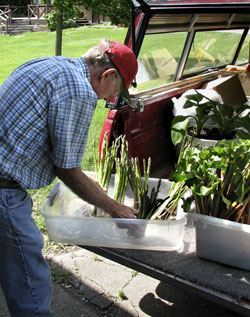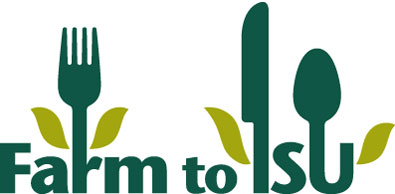Inside Iowa State
Inside ArchivesSubmit newsSend news for Inside to inside@iastate.edu, or call (515) 294-7065. See publication dates, deadlines. About InsideInside Iowa State, a newspaper for faculty and staff, is published by the Office of University Relations. |
June 12, 2008 Farm to ISU program grows into second yearby Erin Rosacker 
Dick DeMoss, shown here with spring asparagus and rhubarb from his Gilbert farm, put in 700 tomato plants to produce a variety better suited for ISU's needs. Photo by Erin Rosacker. With an annual budget of $6 million to spend on food annually, ISU Dining initiated a program to earmark a percentage of those dollars toward buying organic, sustainable and local products. Now completing its first year, the Farm to ISU program is on track to exceed its purchasing goal (5 percent), with about 10 percent ($509,932) spent this year. "Through building better relationships with producers, there has been an increase this year," said Sue DeBlieck, Farm to ISU coordinator and graduate student in sustainable agriculture. "Farm to ISU is local, sustainable and organic; however the focus has been on local," she said. "Not only because that's what the ISU Dining staff members are interested in working with and can see the value of, but also because it clearly helps our local economy." Timing is everythingUnfortunately, the bounty season for much of Iowa's produce is during the summer months when students are sparse on campus. For the busier months, ISU Dining does take advantage of what's at the height of its harvest. "The residence halls have a seasonal vegetable every growing-season month that they feature in their menus," DeBlieck said. That means apples, squash, cabbage and peppers are headliners in the fall. This spring, ISU Dining added asparagus from three local growers to the menu. Meat and dairy products have year-round availability and account for the bulk of Farm to ISU products. For instance, the pork used at the Memorial Union's Burrito Works is hormone-free meat trucked in from Hubbard, and the Cultural Revolution organic yogurt found at the MU Cafe and Hawthorn Market are from Kalona. DeBlieck said 76 percent of dairy purchases, 0.2 percent of bakery goods and grocery items, and 3 percent of meat purchases were made through the Farm to ISU program last year, while 1.5 percent of the produce was local. ISU Dining's honey supply is local (Lynnville) and some spices and specialty teas are organic. Keeping it growing"My focus this year is specifically working with more ISU Dining staff, helping them move forward with this program," DeBlieck said. "I want to make sure that they are interested in doing it, and they are aware of the values of local food." That includes inviting area farmers to campus for lunch with ISU Dining staff, and taking staff members on a farm tour this month. DeBlieck said both farmers and staff worked through the first-year jitters, carefully observing the program. Farmers are getting a better understanding of ISU's needs, and communication continues to improve throughout the ISU Dining system so the value of the products are recognized, from the buyer, to the menu coordinator, to the chef. "Hopefully, this year we'll have less apprehension and the next year we'll have more growth," she said. "I'm trying to get everyone to know what's going on, so there are lines of communication and there is more understanding." Already, ISU Dining plans to purchase fall produce from ISU's horticulture station and the student organic farm. Dick and Letha DeMoss, both retired ISU staffers, have 16 acres of land on their farm near Gilbert devoted to growing vegetables. Much of the produce is sold at the farmers' market, but their squash, pumpkins and gourds have shown up in ISU Dining eateries. This year, the DeMoss farm is growing a tomato variety that better suits ISU's needs. Each of the 700 plants should produce 30 to 40 pounds of tomatoes for the Farm to ISU program. "Iowa State has the right idea," Dick DeMoss said. "It's going to take a while for local growers to get them what they want and when they want it." |

Quote"Farm to ISU is local, sustainable and organic; however the focus has been on local," she said. "Not only because that's what the ISU Dining staff members are interested in working with and can see the value of, but also because it clearly helps our local economy." Sue DeBlieck, Farm to ISU coordinator |